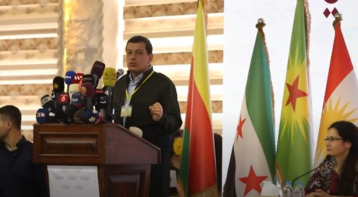-
After Tehran suffered rolling blackouts, Iran bans bitcoin mining

FILE PHOTO: A representation of virtual currency Bitcoin is seen in front of a stock graph in this illustration taken January 8, 2021.
REUTERS/DADO RUVIC/FILE PHOTO/FILE PHOTO
Joe Sommerlad
Iran has moved to ban bitcoin mining after a number of its cities including Tehran suffered rolling blackouts due to the increased strain placed on the country’s ageing electricity infrastructure from accelerating demand.
Speaking on state TV, Iranian president Hassan Rouhani said the ban would be in effect until 22 September, blaming the problem on unlicensed miners operating without an official permit.
“Now everybody has a few miners laying around and are producing bitcoins,” he said during the televised cabinet meeting, acting decisively with a month to go before the county goes to the polls in its latest presidential election to decide his future.
The country’s state-run power company Tavanir said on Wednesday that the country only has 50 licensed bitcoin farms and that 85 per cent of mining is carried out illegally, running on 95MW per hour of state-subsidised energy.
Iran has been hard-hit by overwhelming demand on its power networks of late, which has increased markedly as the arrival of the sweltering summer months pushes up air conditioning use and government stay-at-home orders in response to the coronavirus pandemic mean more household electronic devices are in use.
The surge has even resulted in medical facilities struggling to run vital cold storage units.
However, there is disagreement within the Iranian parliament as to whether cryptocurrency mining is really to blame, with the head of its digital economy commission Mojtaba Tavangar recently insisting that the sector accounts for just one per cent of domestic energy use and arguing: “The reason behind the power outages is not cryptocurrency mining, it’s stopping funding and the old distribution and generation network.”
An Elliptic study published earlier this week suggested that Iran now accounts for 4.5 per cent of the world’s bitcoin mining, with users attracted by the prevalence of cheap power backed by its plentiful natural gas reserves.
Generating the electricity required to maintain the practice involves the equivalent of around 10 million barrels of crude oil a year or four per cent of total Iranian oil exports in 2020, according to Elliptic.
The report also alleged that the rogue state was using cryptocurrency as a means of bypassing damaging economic sanctions placed on it by the US and other nations as punishment for its refusal to dismantle its nuclear programme and support for organisations considered to be terror groups.
US president Joe Biden’s administration and other global powers have been in talks with Tehran to revive a 2015 nuclear deal that was torn up by his predecessor, Donald Trump.
This is not the first time Iran has cracked down on illegal bitcoin mining, the country seizing 50,000 computers in January and offering a IRR200 million (£3,370) reward to any whistleblower who comes forward with information on illegal activity.
China and Turkey have also made similar moves against the cryptocurrency this year after its popularity boomed during the pandemic, while it has increasingly attracted negative attention over its intensive energy demands and significant contribution to the climate crisis.
Influential tech entrepreneur and investor Elon Musk caused a further ripple in digital coin markets this week when he said he had been in discussion with miners over some “potentially promising” green solutions to the issue.
The Independent, May 27, 2021, 10:00 A.M GMT
Image Ownership Reuters
Tags
You May Also Like
Popular Posts
Caricature
BENEFIT Sponsors BuildHer...
- April 23, 2025
BENEFIT, the Kingdom’s innovator and leading company in Fintech and electronic financial transactions service, has sponsored the BuildHer CityHack 2025 Hackathon, a two-day event spearheaded by the College of Engineering and Technology at the Royal University for Women (RUW).
Aimed at secondary school students, the event brought together a distinguished group of academic professionals and technology experts to mentor and inspire young participants.
More than 100 high school students from across the Kingdom of Bahrain took part in the hackathon, which featured an intensive programme of training workshops and hands-on sessions. These activities were tailored to enhance participants’ critical thinking, collaborative problem-solving, and team-building capabilities, while also encouraging the development of practical and sustainable solutions to contemporary challenges using modern technological tools.
BENEFIT’s Chief Executive Mr. Abdulwahed AlJanahi, commented: “Our support for this educational hackathon reflects our long-term strategic vision to nurture the talents of emerging national youth and empower the next generation of accomplished female leaders in technology. By fostering creativity and innovation, we aim to contribute meaningfully to Bahrain’s comprehensive development goals and align with the aspirations outlined in the Kingdom’s Vision 2030—an ambition in which BENEFIT plays a central role.”
Professor Riyadh Yousif Hamzah, President of the Royal University for Women, commented: “This initiative reflects our commitment to advancing women in STEM fields. We're cultivating a generation of creative, solution-driven female leaders who will drive national development. Our partnership with BENEFIT exemplifies the powerful synergy between academia and private sector in supporting educational innovation.”
Hanan Abdulla Hasan, Senior Manager, PR & Communication at BENEFIT, said: “We are honoured to collaborate with RUW in supporting this remarkable technology-focused event. It highlights our commitment to social responsibility, and our ongoing efforts to enhance the digital and innovation capabilities of young Bahraini women and foster their ability to harness technological tools in the service of a smarter, more sustainable future.”
For his part, Dr. Humam ElAgha, Acting Dean of the College of Engineering and Technology at the University, said: “BuildHer CityHack 2025 embodies our hands-on approach to education. By tackling real-world problems through creative thinking and sustainable solutions, we're preparing women to thrive in the knowledge economy – a cornerstone of the University's vision.”
opinion
Report
ads
Newsletter
Subscribe to our mailing list to get the new updates!






















